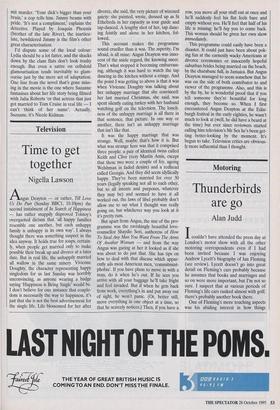Television
Time to get together
Nigella Lawson
Angus Deayton — or rather, Till Love Us Do Part (Sunday BBC1, 10.10pm) the second instalment of In Search of Happiness — has rather snappily disproved Tolstoy's overquoted dictum that 'all happy families resemble one another, but each unhappy family is unhappy in its own way'. I always thought there was something suspect in the idea anyway. It holds true for soaps, certain- ly, when people get married only to make possible their break up and divorce at a later date. But in real life, the unhappily married all wallow in the same misery. Vivienne Doughty, the character representing happy singledom for us last Sunday was horribly unconvincing, as anyone wearing a badge saying 'Happiness is Being Single' would be. I don't believe for one instance that couple- dom is necessarily the way to happiness, it's just that she is not the best advertisement for the single life. Life blossomed for her after divorce, she said, the very picture of wizened gaiety: she painted, wrote, dressed up as St Ethelreda in her capacity as tour guide and tap-danced. A lengthy shot of her, tap danc- ing feistily and alone in her kitchen, fol- lowed.
This account makes the programme sound crueller than it was. The asperity, I'm afraid, is all mine: Angus Deayton was inno- cent of the snide regard, the knowing sneer. That's what stopped it becoming embarrass- ing, although it was hard to watch the tap dancing in the kitchen without a cringe. And the point I was getting to above is that it was when Vivienne Doughty was talking about her unhappy marriage that she convinced: her last married Christmas, she said, was spent silently eating turkey with her husband watching golf on the television. The loneli- ness of the unhappy marriage is all there in that sentence, that picture. In one way or another, there isn't an unhappy marriage that isn't like that.
It was the happy marriage that was strange. Well, maybe that's how it is. But what was strange here was that it comprised three people: a pair of identical twins called Keith and Clive (very Martin Amis, except that these two were a couple of fey, ageing Welshman in faded denim) and a redhead called Georgia. And they did seem idyllically happy. They've been married for over 30 years (legally speaking not all to each other, but to all intents and purposes, whatever they may be) and seemed to have it all worked out. the laws of libel probably don't allow me to say what I thought was really going on, but whichever way you look at it it's pretty rum.
But apart from Angus, the star of the pro- gramme was the ravishingly beautiful love- counsellor Shaydie Sori, authoress of How To Steal Any Man You Want From The Arms Of Another Woman — and from the way Angus was gazing at her it looked as if she was about to do just that. She has tips on how to deal with that disease which appar- ently ails most American men, 'commitrnint- phobia'. If you have plans to move in with a man, do it when he's out. If he sees you arrive with all your baggage he'll take fright and feel invaded. But if when he gets back from work, everything's in and put away out of sight, he won't panic. (Or, better still, move everything in one object at a time, so that he scarcely notices.) Then, if you have a row, you move all your stuff out at once and he'll suddenly feel his flat feels bare and empty without you. He'll feel that half of his life is missing: he'll beg you to come back. This woman should be given her own show immediately.
This programme could easily have been a disaster. It could just have been about pok- ing fun at the earnestly wacky Americans at divorce ceremonies or innocently hopeful suburban brides being married on the beach, by the charabanc full, in Jamaica. But Angus Deayton managed to seem somehow that he was on the side of both contributor to and viewer of the programme. Also, and this is by the by, he is wonderful proof that if you tell someone they're beautiful for long enough, they become so. When I first encountered Angus Deayton at the Edin- burgh festival in the early eighties, he wasn't much to look at (well, he did have a beard at the time) but ever since reviewers started calling him television's Mr Sex he's been get- ting better-looking by the moment. It's begun to take. Television critics are obvious- ly more influential than I thought.


































































 Previous page
Previous page